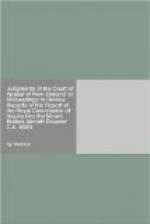The language of paragraph 377 has evidently been carefully selected for maximum colour and bite, and the Commissioner has sought to reinforce its impact by bringing in his status and experience as a judicial officer. While unfortunate, it is no doubt that result of a search for sharp and striking expression in a report that would be widely read. He cannot have overstated the evidence deliberately. Similarly at senior management level in Air New Zealand there would have been a natural tendency to try to have the company’s case put in as favourable a light as possible before the Commission; but it was adding a further and sinister dimension to their conduct to assert that they went as far as organised perjury.
Costs
The applicants ask for an order quashing one of the Commissioner’s decisions as to costs. The decision in question and the reasons for it are stated in an appendix to the report:
... I asked the airline for its submissions on the question of costs. The general tenor of the submissions is that the establishment of this Royal Commission was directed by the New Zealand Government and that the airline should not be ordered to meet any part of the public expenditure so incurred. As a statement of general principle, this is correct. But there is specific statutory power to order that a party to the inquiry either pay or contribute towards the cost of the inquiry, and that the power should be exercised, in my opinion, whenever the conduct of that party at the hearing has materially and unnecessarily extended the duration of the hearing. This clearly occurred at the hearings which took place before me.
In an inquiry of this kind, an airline can either place all its cards on the table at the outset, or it can adopt an adversary stance. In the present case, the latter course was decided upon. The management of the airline instructed its counsel to deny every allegation of fault, and to counter-attack by ascribing total culpability to the air crew, against whom there were alleged no less than 13 separate varieties of pilot error. All those allegations, in my opinion, were without foundation. Apart from that, there were material elements of information in the possession of the airline which were originally not disclosed, omissions for which counsel for the airline were in no way responsible, and which successively came to light at different stages of the Inquiry when the hearings had been going on for weeks, in some cases for months. I am not going to burden this recital with detailed particulars, but I should have been told at the outset that the flight path from Hallett to McMurdo was not binding on pilots, that Captain Wilson briefed pilots to maintain whatever altitudes were authorised by McMurdo Air Traffic Control, that documents were ordered by the chief executive to be destroyed, that an investigation committee had been set




